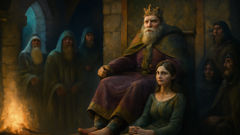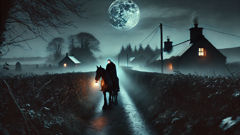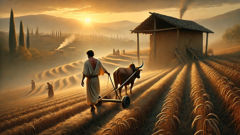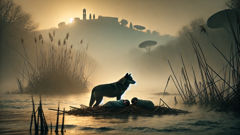Introduction
Beneath the shifting mists of ancient Wales, where the mountains roll into dark forests and the wind carries stories older than stone, there once ruled a king both powerful and strange—Math, son of Mathonwy. His wisdom was revered and his magic whispered about in every hearth-lit hall from Gwynedd to the sea. Yet, Math’s life was bound by a peculiar fate: whenever he was not at war, he could only live if his feet rested in the lap of a virgin maiden. In his castle of Caer Dathyl, surrounded by loyal vassals and ever-watchful druids, Math’s court pulsed with secrets, ambitions, and enchantments that blurred the line between the natural and the supernatural.
It was a land where ancient oaks guarded the paths, where rivers sang of lost loves, and where the air shimmered with the possibility of transformation. In this world, a single desire could spark a chain of events leading to war or wonders. The tale that unfolded in Math’s realm was woven from the threads of longing and loyalty, betrayal and beauty, all set against the wild tapestry of Welsh myth. Here, gods walked in human form, flowers gave birth to women, and vengeance could take the shape of an owl’s silent flight beneath the moon.
This is the final branch of the Mabinogi, a chronicle of sorcery and sorrow, of brothers driven apart and destinies shaped by magic’s touch. It is a story where every act echoes through the hills and valleys, and every transformation is both a blessing and a curse. Through Math’s trials, through the schemes of Gwydion and Gilfaethwy, and the haunting creation of Blodeuwedd, the land itself seems to breathe with ancient secrets waiting to be uncovered. If you listen closely, you might still hear the footsteps of those who walked these paths long ago, their stories etched into the bones of the earth itself.
A Court Shaken: The Betrayal of Goewin
In the heart of Caer Dathyl, Math’s court buzzed with life and intrigue. The king’s custom—resting his feet in the lap of a virgin when not at war—was no simple eccentricity. It was a magical necessity that kept him alive, and so Goewin, the most trusted maiden of the court, fulfilled this sacred duty. Yet beyond the stately rituals, deeper forces stirred. Math’s nephews, Gwydion and Gilfaethwy, both sons of Don, nursed a secret longing. Gilfaethwy’s desire for Goewin festered, turning from admiration to obsession. He shared his yearning with his clever brother Gwydion, who was known for weaving spells as deftly as words.
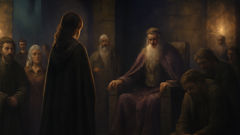
Gwydion, eager to help his brother and always seeking to test the limits of his craft, devised a cunning plan. News reached them that King Pryderi of Dyfed possessed a herd of magical swine, gifts from the Otherworld, swine unlike any in the land. The brothers approached Math and suggested they seek these treasures. Math, ever open to the counsel of his kin, agreed. He entrusted the kingdom’s safety to Gwydion and Gilfaethwy, never suspecting their motives. Disguised as wandering bards, they set forth to Dyfed, their minds set not on diplomacy, but on trickery.
Their journey was swift, and soon they stood before Pryderi, singing songs of distant lands and offering wondrous gifts conjured by Gwydion’s enchantments—illusions so lifelike that even Pryderi, wise in magic himself, could not resist. In exchange for these marvels, Pryderi handed over his precious swine, warning that they must not be given away or traded. Gwydion nodded, concealing his true intent, and the brothers returned to Gwynedd with their prize.
Their deception did not go unnoticed. Pryderi soon discovered the swine’s true nature and the tricks that had been played upon him. He raised his banners and marched on Gwynedd, igniting a brutal war between the two kingdoms. In the chaos of battle, Math was called away from his court, leaving Goewin vulnerable. Gilfaethwy, consumed by desire, seized the moment. He forced himself upon Goewin, shattering her innocence and Math’s sacred trust. The war’s cost was high, but Math’s army ultimately prevailed, defeating Pryderi in single combat. Victory, however, was bitter when news of Goewin’s suffering reached the king’s ears.
Math’s anger was as cold as the winter’s breath. He summoned his nephews and, in a voice that carried the weight of mountains, demanded an account of their deeds. Goewin stood before the court, her voice steady as she recounted her ordeal. Math, filled with sorrow and shame for his court’s failing, offered her marriage and made her his queen, restoring her honor. But for Gwydion and Gilfaethwy, there would be no such mercy. The king unleashed a punishment as imaginative as it was cruel—transforming the brothers into beasts, binding them together for three years.
First, they became a pair of stags; the next year, wild boars; and in the third, wolves. Each year they mated and produced offspring, which Math took into his care. Only after enduring the pain and humiliation of animal lives did Math allow them to return to human form, forever marked by their crimes and transformed by their suffering.
The Making of Blodeuwedd: Magic in the Wild
After order returned to Caer Dathyl, Math sought to fill the vacant position of foot-holder—a role now honored, not burdened. He asked Gwydion, restored but still penitent, to recommend a new maiden. Gwydion named his own sister, Arianrhod, daughter of Don. When Math tested her with his magic, however, Arianrhod’s virtue faltered; she stepped over Math’s wand and immediately birthed two sons—Dylan, who fled to the sea, and a second boy whom Gwydion spirited away to raise as his own.
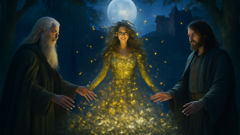
Arianrhod, embarrassed and angry, denied her son three times: refusing him a name, refusing him arms, and refusing him a wife. Gwydion, loyal to his nephew, tricked her into granting each denied right. He named the boy Lleu Llaw Gyffes through clever ruse; he helped him win arms in disguise; but when it came to a wife, Arianrhod swore Lleu would never marry a woman of any race upon this earth. Math and Gwydion pondered this curse. If no mortal or known woman could wed Lleu, they would create one not born of humans or gods. So together, they wove an enchantment deep in the wilds of Gwynedd, beneath moonlit oaks and on banks carpeted with blooms.
They gathered the blossoms of oak, broom, and meadowsweet—each flower chosen for its beauty and power. Their words of magic hummed in the air, twisting petals and stems into form, calling forth life from the scent and color of nature itself. From this fragrant union emerged Blodeuwedd—"Flower Face"—a maiden of otherworldly beauty, her hair the gold of broom, her skin pale as meadowsweet, and her eyes as green as new oak leaves. She was a living miracle, gentle and curious, imbued with both innocence and the wild mystery of the woods.
Lleu fell in love at once, and Blodeuwedd embraced him with wonder. Math blessed their union, granting them a home at the fortress of Mur Castell. The land flourished under their care, and for a time, it seemed that joy would last forever. Yet, Blodeuwedd’s heart was never truly tethered to Lleu or to the customs of men. She wandered the forests restlessly, drawn to the moonlit waters and the untamed creatures that whispered secrets only she could hear. The enchantment that gave her life also made her different—neither wholly human nor fully free.
It was on one such wandering that fate brought Gronw Pebr, lord of Penllyn, across her path. Their meeting was electric—a collision of longing and recognition between two souls outside the boundaries of ordinary destiny. Blodeuwedd and Gronw fell swiftly into a forbidden love that would unravel all the careful magic that had gone before.
Love and Betrayal: The Doom of Lleu
Blodeuwedd’s days in Mur Castell were marked by both beauty and yearning. While she fulfilled her role as Lleu’s wife, her heart remained restless—a spirit born from flowers, unbound by custom or expectation. The arrival of Gronw Pebr awakened something wild within her. He was unlike any man she had known—fierce yet gentle, attuned to the rhythms of the land and skies, his presence as compelling as a summer storm rolling over the hills. Their secret meetings were hidden in the tangled woods and beside shadowed streams. Each encounter wove a deeper bond, until Blodeuwedd could not imagine a life without him.
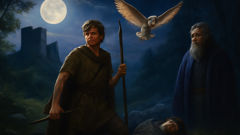
The lovers conspired in whispers. Gronw was determined to possess Blodeuwedd openly, but Lleu’s fate was protected by enchantment—he could not be killed in any ordinary way. Suspicion clouded Gronw’s mind: how could they be together unless Lleu was removed? Blodeuwedd, torn between guilt and desire, pressed Lleu for the secret of his death. Each night, her questions grew more insistent until finally, he relented—explaining that he could only die under impossible conditions: not indoors nor outdoors, not on horseback nor on foot, not clothed nor naked, and only by a spear forged over a year during sacred hours.
With each detail, Gronw and Blodeuwedd plotted. Gronw began forging a spear as instructed, working tirelessly beneath the moon. When the year was done and all was prepared, Blodeuwedd tricked Lleu into demonstrating the unique circumstances—bathing him between a riverbank and a goat, with one foot on each, wearing nothing but a net. At that precise moment, Gronw struck, hurling the enchanted spear into Lleu’s side. With a terrible cry, Lleu transformed into an eagle and vanished into the dusk, leaving Blodeuwedd and Gronw to claim Mur Castell as their own.
But Lleu was not dead. Wounded and changed, he soared through the wilds of Gwynedd, his cries echoing across valleys. Gwydion, ever watchful, followed the rumors of a strange eagle and found Lleu perched in an ancient oak, feathers matted with blood and sorrow. Through song and magic, Gwydion lured him down, restoring him to human form and healing his wounds.
Lleu’s grief was matched only by his resolve. With Gwydion’s aid, he raised an army and marched on Mur Castell. The final reckoning was swift and fierce. Gronw tried to flee but was brought to face Lleu in single combat. Lleu allowed Gronw to shield himself with a stone, but his spear pierced it and Gronw fell dead. As for Blodeuwedd, Gwydion met her in the woods and transformed her into an owl—forever cursed to haunt the night, shunned by all other birds, her beauty twisted by fate. Yet in every owl’s flight through the Welsh night, there lingers the memory of Blodeuwedd’s wild yearning and the magic that birthed her.
Conclusion
The tale of Math son of Mathonwy lingers long after its telling, echoing through Welsh hills and hedgerows where owls call in the dusk. It is a story woven from longing and loss, from the tangled roots of family and the wild unpredictability of magic. The fates of Math, Gwydion, Gilfaethwy, Lleu, and Blodeuwedd reveal that every act—however small or desperate—can reverberate through lives and generations. Here, love is both a blessing and a curse; transformation is both punishment and possibility. Magic does not shield anyone from sorrow or consequence. It only amplifies the power of human desire, for better or worse.
Yet amid the betrayals and battles, there endures a hope as constant as the returning spring: that honor can be restored, wounds can heal, and even those born of enchantment—like Blodeuwedd—can leave their mark on the world. In every oak and meadow, in every moonlit glade where an owl glides silently overhead, the story persists. The final branch of the Mabinogi invites us to look past appearances, to recognize beauty’s danger as well as its promise, and to listen for ancient truths carried on the wind.

